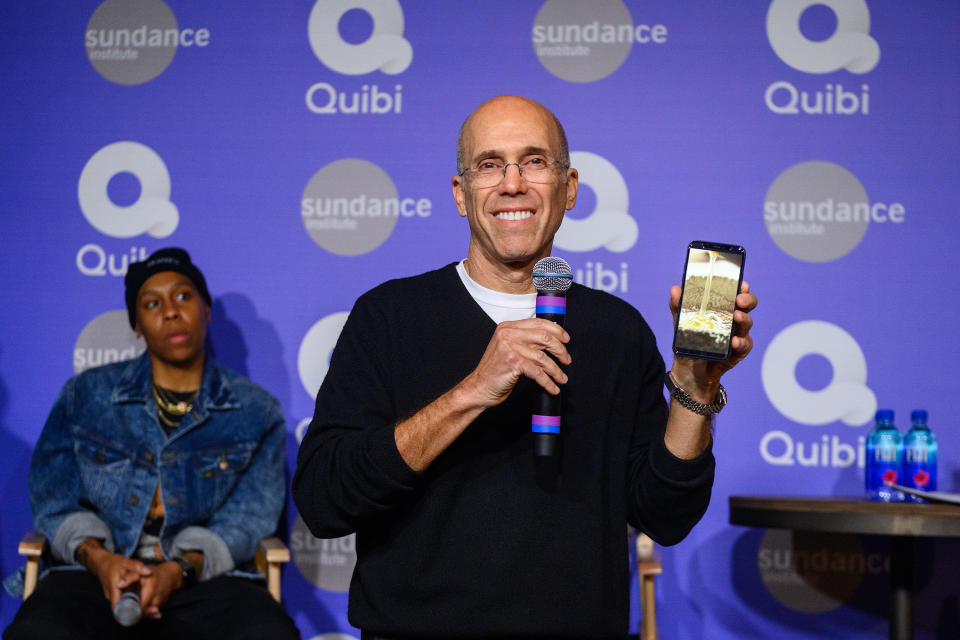Why streaming service Quibi faces heavy skepticism
The original content spending bubble that is driving the subscription streaming wars is still expanding before it contracts. The next new entrant is Quibi, launching on April 6 for $4.99 per month with ads or $7.99 without ads.
Quibi, named for “quick bites” (videos shorter than 10 minutes), is the brainchild of former HP CEO Meg Whitman and former DreamWorks boss Jeffrey Katzenberg. The duo are betting that snack-sized videos—a novel strategy among the high-profile subscription streaming platforms—can earn Quibi an instant subscriber base.
That’s a big bet, and some industry onlookers are highly skeptical.
NYU marketing professor and tech commentator Scott Galloway is skeptical because of Quibi’s budget, which was $1 billion until just last week.
“$1 billion is literally bringing a squirt gun to a howitzer fight,” Galloway said on Yahoo Finance earlier this month. “How can anything with just a billion bucks enter the streaming video wars and do anything right now? Quibi is stillborn.”
Last week, Quibi announced another $750 million in private funding, bringing its total war chest to $1.75 billion.
That still places it behind almost all the other big names Quibi is competing with for share of wallet: Netflix will reportedly spend more than $17 billion on original content this year; Amazon will spend $8 billion; Apple TV+ will spend more than $5 billion; Disney will spend $6 billion between Disney+ and Hulu; HBO Max, launching in May, will spend $2 billion.
The streaming wars have rapidly created an unprecedented spending frenzy, and Quibi will struggle to muscle its way in without spending more.
“I’m trying to figure out what industry has ever registered an incremental cap-ex investment in their category from new players of $40 billion to $50 billion in 24 months,” says Galloway. He cites Apple TV+ as a good comparison: Apple is charging the same price as Quibi, but for $5 billion worth of content. “Because they can,” Galloway says. “They don’t need it to be profitable because if they sell more [iPhones]... they’re just fine.”

IAC chairman Barry Diller sounds skeptical for a different reason: Quibi is starting from scratch, with no existing must-watch popular show.
It’s a “gutsy speculation,” Diller said on an NBC News podcast. “Most people when they hear it aren’t overwhelmed by the idea, which makes it all the gutsier.” Diller, famously candid in interviews, added that Jeffrey Katzenberg is “naked out there with this.”
Diller’s point is one many have echoed: Quibi has to bank on its concept to attract subscribers, as opposed to a single hit show.
The other big services each had one or two mega-hit shows that some people see as must-watch, and those shows are exclusive to those services. Netflix had “House of Cards” and “Orange is the New Black” as its first big originals, and now has “The Crown” and “Stranger Things.” Amazon Prime made its name with “Transparent” and “The Marvelous Mrs. Maisel.” Hulu has “The Handmaid’s Tale” and now, after Disney bought a majority stake, is getting the entire FX library.
Quibi has no single series to hang its hat on—yet.
Still, it will launch with 50 shows, including from some of the biggest publications and networks: ESPN will run a daily highlights show called “The Replay”; CBS will run a shorter version of “60 Minutes” called “60 in 6”; Entertainment Weekly will run a recap of late-night talk shows called “Last Night’s Last Night.” Then there are also a number of shows slated with big-name actors, like “Most Dangerous Game,” starring Liam Hemsworth and Christoph Waltz, and “Chrissy’s Court,” a small-claims court show hosted by Chrissy Teigen.
Some in the industry say all that matters is the quality of the content, that the streaming wars are a meritocracy where quality will always be rewarded.
Jason Kilar, the former CEO of Hulu, tweeted last month, “If the content is great and in sufficient quantity, I believe Quibi will shine. So many talented people on that team. I applaud every one of them for keeping their heads down and focusing on doing great work for consumers. That is all that matters.” Rich Greenfield, a media analyst at LightShed, tweeted, “I don’t often see platforms with compelling content fail.”
And everything on Quibi will be new, which could actually be an advantage over the incumbents. On Disney+, more than half the content is more than 10 years old.
“If we bring people a quality experience, quality storytelling from the best people, it’s always worked for me,” Katzenberg said on Bloomberg TV this month. “I have to say, that’s never failed me in 45 years.”
Still, Quibi will likely be forced to keep ramping its spending in year two and beyond, and the spending frenzy in the streaming wars favors the deepest pockets: Netflix, Amazon, Apple, and Disney. “That kind of describes our economy,” Galloway notes. “You can go sector by sector by sector, more and more power accretes to one or two firms.”
As Forrester analyst James McQuivey told the Wall Street Journal in August, “It’s not about product. It’s about minutes, the number of ways people can spend the next 15 minutes... If you’re the fourth or fifth subscription service people pay for every month, you’re as easy to leave as to try.”
Quibi is just the first of three more streaming services launching in the next four months: Quibi in April, HBO Max in May, and NBC Peacock in July.
—
Daniel Roberts is an editor-at-large at Yahoo Finance and closely covers Netflix, Disney, and the streaming wars. Follow him on Twitter at @readDanwrite.
Read more:
Disney+, Apple TV+ and Netflix can coexist—for now
Discovery CEO predicts ‘carnage’ in the streaming wars
In streaming wars, live sports could set Peacock apart
When will America hit peak streaming?

 Yahoo Finance
Yahoo Finance 
